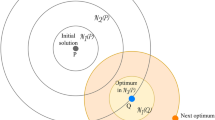Abstract
In this paper, an improved harmony search (IHS) algorithm is proposed to solve the distributed two machine flow-shop scheduling problem (DTMFSP) with makespan criterion. First, a two-stage decoding rule is developed for the decimal vector based representation. At the first stage, a job-to-factory assignment method is designed to transform a continuous harmony vector to a factory assignment. At the second stage, the Johnson’s method is applied to provide a job sequence in each factory. Second, a new pitch adjustment rule is developed to adjust factory assignment effectively. The influence of parameter setting on the IHS is investigated based on the Taguchi method of design of experiments, and numerical experiments are carried out. The comparisons with the global-best harmony search and the original harmony search demonstrate the effectiveness of the IHS in solving the DTMFSP.
Access this chapter
Tax calculation will be finalised at checkout
Purchases are for personal use only
Preview
Unable to display preview. Download preview PDF.
Similar content being viewed by others
References
Johnson, S.M.: Optimal two- and three-stage production schedules with setup times included. Nav. Res. Logist. Quart. 1, 61–68 (1954)
Ku, P.S., Niu, S.C.: On Johnson’s two-machine flow shop with random processing times. Oper. Res. 34, 130–136 (1986)
The two-machine total completion time flow shop problem: Della Croce, F., Narayan, V., Tadei, R. Eur. J. Oper. Res. 90, 227–237 (1996)
Sayin, S., Karabati, S.: Theory and Methodology: a bicriteria approach to the two-machine flow shop scheduling problem. Eur. J. Oper. Res. 113, 435–449 (1999)
Croce, Della: F., Ghirardi, M., Tadei, R.: An improved branch-and-bound algorithm for the two machine total completion time flow shop problem. Eur. J. Oper. Res. 139, 293–301 (2002)
Pan, J.C.H., Chen, J.S., Chao, C.M.: Minimizing tardiness in a two-machine flow-shop. Comput. Oper. Res. 29, 869–885 (2002)
Toktaş, B., Azizoğlu, M., Köksalan, S.K.: Two-machine flow shop scheduling with two criteria: maximum earliness and makespan. Eur. J. Oper. Res. 157, 286–295 (2004)
Blazewicz, J., Pesch, E., Sterna, M., Werner, F.: Metaheuristic approaches for the two-machine flow-shop problem with weighted late work criterion and common due date. Comput. Oper. Res. 35, 574–599 (2008)
Ng, C.T., Wang, J.B., Cheng, T.C.E., Liu, L.L.: A branch-and-bound algorithm for solving a two-machine flow shop problem with deteriorating jobs. Comput. Oper. Res. 37, 83–90 (2010)
Kasperski, A., Kurpisz, A., Zieliński, P.: Approximating a two-machine flow shop scheduling under discrete scenario uncertainty. Eur. J. Oper. Res. 217, 36–43 (2012)
Jia, H.Z., Nee, A.Y.C., Fuh, J.Y.H., Zhang, Y.F.: A modified genetic algorithm for distributed scheduling problems. J. Intell. Manuf. 14, 351–362 (2003)
Moon, C., Seo, Y.: Evolutionary algorithm for advanced process planning and scheduling in a multi-plant. Comput. Ind. Eng. 48, 311–325 (2005)
Chan, F.T.S., Chung, S.H., Chan, P.L.Y.: Application of genetic algorithms with dominant genes in a distributed scheduling problem in flexible manufacturing systems. Int. J. Prod. Res. 44, 523–543 (2006)
Naderi, B., Ruiz, R.: The distributed permutation flowshop scheduling problem. Comput. Oper. Res. 37, 754–768 (2010)
Behnamian, J.: Fatemi Ghomi, S.M.T.: The heterogeneous multi-factory production network scheduling with adaptive communication policy and parallel machine. Inf. Sci. 219, 181–196 (2013)
Hatami, S., Ruiz, R., Andrés-Romano, C.: The distributed assembly permutation flowshop scheduling problem. Int. J. Prod. Res. 51, 5292–5308 (2013)
Wang, S.Y., Wang, L., Liu, M., Xu, Y.: An effective estimation of distribution algorithm for solving the distributed permutation flow-shop scheduling problem. Int. J. Prod. Econ. 145, 387–396 (2013)
Naderi, B., Azab, A.: Modeling and heuristics for scheduling of distributed job shops. Expert Syst. Appl. 41, 7754–7763 (2014)
Garey, M.R., Johnson, D.S.: “Strong” NP-completeness results: motivation, examples, and implications. J. ACM 25, 499–508 (1978)
Geem, Z.W., Kim, J.H., Loganathan, G.V.: A new heuristic optimization algorithm: harmony search. Simul. 76, 60–68 (2001)
Lee, K.S., Geem, Z.W.: A new meta-heuristic algorithm for continuous engineering optimization: harmony search theory and practice. Comput. Methods Appl. Mech. Eng. 194, 3902–3933 (2005)
Geem, Z.W., Lee, K.S., Park, Y.: Application of harmony search to vehicle routing. Am. J. Appl. Sci. 2, 1552 (2005)
Kaveh, A., Talatahari, S.: Particle swarm optimizer, ant colony strategy and harmony search scheme hybridized for optimization of truss structures. Comput. Struct. 87, 267–283 (2009)
Geem, Z.W.: Particle-swarm harmony search for water network design. Eng. Optim. 41, 297–311 (2009)
Rao, Srinivasa: R., Narasimham, S.V.L., Ramalinga Raju, M., Srinivasa Rao, A.: Optimal network reconfiguration of large-scale distribution system using harmony search algorithm. IEEE Trans. Power Syst. 26, 1080–1088 (2011)
Wang, L., Pan, Q.K., Tasgetiren, M.F.: A hybrid harmony search algorithm for the blocking permutation flow shop scheduling problem. Comput. Ind. Eng. 61, 76–83 (2011)
Lee, K.S., Geem, Z.W., Lee, S.H., Bae, K.W.: The harmony search heuristic algorithm for discrete structural optimization. Eng. Optim. 37, 663–684 (2005)
Mahdavi, M., Fesanghary, M., Damangir, E.: An improved harmony search algorithm for solving optimization problems. Appl. Math. Comput. 188, 1567–1579 (2007)
Baker, K.R.: Introduction to Sequencing and Scheduling. Wiley, New York (1974)
Omran, M.G.H., Mahdavi, M.: Global-best harmony search. Appl. Math. Comput. 198, 643–656 (2008)
Author information
Authors and Affiliations
Corresponding author
Editor information
Editors and Affiliations
Rights and permissions
Copyright information
© 2016 Springer-Verlag Berlin Heidelberg
About this paper
Cite this paper
Deng, J., Wang, L., Shen, J., Zheng, X. (2016). An Improved Harmony Search Algorithm for the Distributed Two Machine Flow-Shop Scheduling Problem. In: Kim, J., Geem, Z. (eds) Harmony Search Algorithm. Advances in Intelligent Systems and Computing, vol 382. Springer, Berlin, Heidelberg. https://doi.org/10.1007/978-3-662-47926-1_11
Download citation
DOI: https://doi.org/10.1007/978-3-662-47926-1_11
Published:
Publisher Name: Springer, Berlin, Heidelberg
Print ISBN: 978-3-662-47925-4
Online ISBN: 978-3-662-47926-1
eBook Packages: EngineeringEngineering (R0)




